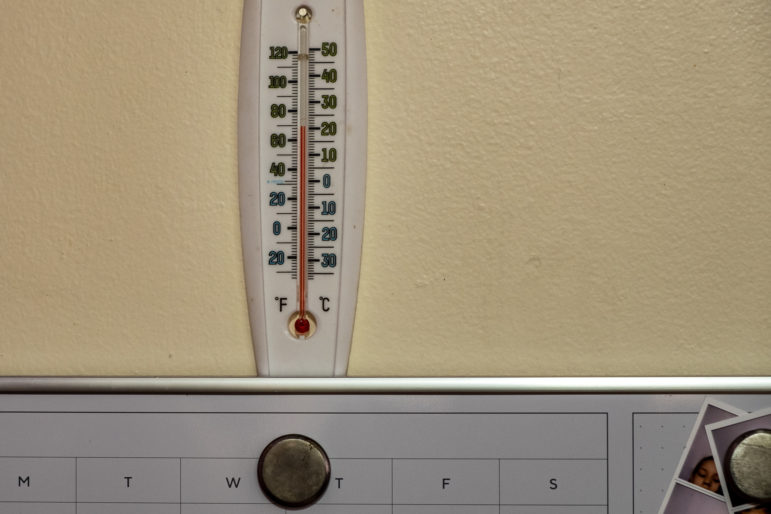
Benjamin Kanter/Mayoral Photo Office.
Mayor de Blasio and HPD chief Torres-Springer. The HPD program delivers on a policy point noted in last year's upgrade to Housing New York.
The city Department of Housing Preservation and Development launched a pilot housing preservation program Tuesday in the Bronx and Manhattan neighborhoods to retain tenants who face harassment from landlords and displacement due to speculative real-estate investments in their homes and communities.
The Partners in Preservation program was first revealed as part of Housing New York 2.0, the revamped housing plan unveiled last year. The new programs came after advocates pushed for more affordable housing on vacant public and private sites and additional protection measures for vulnerable communities. The de Blasio administration Housing New York 2.0 plan’s goal is to achieve 300,000 affordable apartments by 2026.
The pilot housing preservation program, Partners in Preservation, will run for 18 months in Inwood, Washington Heights, East Harlem and Jerome Avenue in the Bronx—neighborhoods where HPD said high rates of speculative investment and rising rents have made residents particularly vulnerable to tenant harassment and displacement.
The Partners in Preservation program plans on funding community-based organizations to coordinate anti-displacement initiatives such as code enforcement, tenant organizing and education, legal representation, affirmative litigation in these neighborhoods. The funding was provided by the city and the nonprofit Enterprise Community Partners with a commitment of $1.5 million.
HPD said the pilot program will focus on four core strategies: using data to identify rent-regulated buildings where harassment and displacement are most likely to occur; creating action plans for each identified building using strategies such as code enforcement, tenant organizing and education, affirmative litigation, and legal counseling; coordinating with community partners to implement those action plans; and targeting specific neighborhoods where building-specific interventions can be paired with comprehensive outreach efforts.
“The point of the program is to see its impact and to find the best ways it can be scaled across the city, said HPD Commissioner Maria Torres-Springer. HPD plans on fully launching the program in the beginning of 2019.
The HPD commissioner said that the agency already has enforcement teams that look into landlords who are not properly managing their buildings and then those landlords are supposed to correct those violations. If conditions are hazardous then the emergency repair program could be activated, meaning the city agency makes the repair and bills the landlord. In cases where the emergency repair program or alternative enforcement program are not effective, the agency says it works with the city’s Department of Buildings to take aggressive actions such as taking away the landlord’s certificate of occupancy. There is also the Certificate of No Harassment program, which is at a pilot stage; it requires landlords to prove they have not harassed tenants before getting permits for building and renovation projects.
The HPD commissioner said that on the other hand the city does have landlords who want to be part of the solution to the housing crisis but may not have the funds. HPD does have programs for those landlords to receive capital financing for rehabilitation as long as the apartments are kept affordable in the long term.
“What is different about Partners in Preservation is that we are taking all those programs [such as Certificate of No Harassment, legal aid for tenants and tenant rights awareness] and looking at specific neighborhoods. In places like Inwood we will at least target 50 buildings where we will understand, do they have preferential rent and what is their violation history?,” said Torres-Springer. “Depending on those answers we will find the right way to improve the conditions for the resident, to get them in a program where affordability can be guaranteed in the long run and where we can prevent the harassment or displacement of residents who live in them today.”
The launch announcement was made during a press conference on the rooftop garden of a newly renovated affordable housing building in Inwood with Manhattan Borough President Gale Brewer, Councilman Ydanis Rodriguez, HPD Commissioner Maria Torres-Springer and Judi Kende, Vice President and New York market leader of Enterprise Community Partners.
Inwood community stakeholders and elected officials are in the middle of a rezoning process where concerns over displacement and rising rents have become louder since the Inwood rezoning plan, spearheaded by Councilman Ydanis Rodriguez, was proposed. It is the fifth neighborhood rezoning sponsored by the de Blasio administration to move through the ULURP process by which a rezoning is approved, amended or rejected. The City Planning Commission voted in favor of the city’s Inwood rezoning proposal last month. The final step in the ULURP process is a vote by the City Council scheduled to take place next month.
“Affordable housing creation and preservation are key to keeping our working families in their homes as they face harassment by bad landlords,” said Rodriguez. He added that the Partners in Preservation program will help Inwood, the largest rent-regulated neighborhood in the city, to stay affordable for Inwood residents.
“In this area, it gets more complicated because you have rent-stabilized, rent-regulated and preferential rent—that is a very challenging legal situation if the owner says, ‘Sorry you no longer have preferential rent,'” said Brewer. She added that community organizers and lawyers are needed to help tenants know what their rights are and how they can activate the Certificate of No Harassment.
HPD said nonprofits that qualify for funding through the Partners in Preservation program will be sought out through a request for proposals (RFP) process later this year .








One thought on “City Moves to Get Nonprofits’ Help Keeping Landlords on Track”
It would be truly amazing to have actual tenants who live with these violations to be involved.
Saw the Commissioner casually dressed in Trader’s Joes W72nd one recent evening she looks like a regular homegirl, we will see.